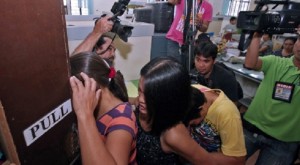
Parents and relatives of the rescued children allegedly victims of Cyber Pornography cover their faces from press photographers and TV cameramen as they rush to the Women and Children Friendly Room in the NBI office for questioning after they were invited during the rescue operation with the US Homeland Security, NBI, Provincial Women Commission and PNP at the Municipality of Cordova. CDN FILE PHOTO
LONDON—British police are working with Australian and US counterparts in breaking up a Philippine pedophile ring that has been streaming live scenes of child abuse over the Internet, the National Crime Agency (NCA) revealed on Thursday.
The NCA, which has been investigating the ring since it discovered obscene videos on a British pedophile’s computer two years ago, called abuse in developing countries “a significant and emerging threat.”
“This investigation has identified some extremely dangerous child sexual offenders who believed paying for children to be abused to order was something they could get away with,” said the agency’s Andy Baker.
“Being thousands of miles away makes no difference to their guilt,” he said. “Protecting the victims of abuse is our priority and that means attacking every link in the chain, from dismantling the organized groups who are motivated by profit through to targeting their customers.”
The inquiry—called Operation Endeavor—has covered 12 countries and led to the arrest of 17 Britons, five of whom have been convicted. Fifteen children aged between 6 and 15 have been rescued in a raid in Angeles City in the Philippines and several parents were arrested.
Three other investigations into live streaming of child abuse have netted 733 suspects globally.
The investigation was sparked when Northamptonshire Police seized the computer of registered sex offender Timothy Ford, who was later jailed for 8 1/2 years after being found guilty of paying to view live sex abuse.
The NCA added: “The use of webcams to stream live abuse, particularly from the developing world, is a significant and emerging threat according to the NCA’s CEOP (Child Exploitation and Online Protection) command.
Child exploitation
“Extreme poverty, the increasing availability of high-speed Internet and the existence of a vast and comparatively wealthy overseas customer base has led to organized crime groups exploiting children for financial gain,” the agency warned.
In a special report, the BBC said that the Philippine government estimated that between 60,000 and 100,000 Filipino children had experienced sexual exploitation, many of them in cybersex. It said that while some children were forced by their own family, others were made to work in cybersex dens by pimps.
Fr. Shay Cullen, who runs the Preda Foundation, a charity that rescues victims of sexual exploitation in Olongapo City, told the BBC that more and more parents were pushing their children to get involved to make big money. “There’s a huge growing demand and there’s a growing supply,” Cullen said.
The BBC team, accompanied by armed police escort, traveled to Barangay (village) Ibabao, an impoverished slum area in Mandaue that it said was the “epicenter” of the trade.
A police officer, Denis Comunay, led the group to a “cybersex den”—a small house that was almost empty except for a dirty mattress on the floor and electric sockets hanging from the ceiling.
“Fathers and mothers would bring their children here to show, and would get paid by the owner of the house,” Comunay said.
He explained the property owner forced her own children to “perform” for foreigners using a webcam. He said other people in the neighborhood who heard there was money to be made brought their children there, too.
The BBC said that a recent survey indicated that 80 houses in the area were involved in the trade, in spite of raids conducted by police. Sex exploitation has become a “cottage industry” in the area, according to the BBC.
Poverty blamed
In September last year, a Filipino couple in their 30s were arrested in Ibabao for forcing their three young children to engage in sex acts and charging clients up to $100 each to watch using webcams.
Noemi Truye-Abarientos of the Children’s Legal Bureau, which provides legal aid to abuse victims, blamed poverty and a breakdown in public morality for the rise in the trade.
She said that local businessmen rented out laptops and USB Internet connections so it was easy for families to get in the business.
“Parents use Internet chat rooms to find ‘clients’ and receive payment through international money transfers. They justify what they do by claiming that foreign pedophiles do not actually touch the children,” the BBC said.
The network said that an arrested British man disclosed he paid 13 pounds (P959) to watch a “show.”
‘Even parents involved’
Senior Supt. Gilbert Sosa, head of the Philippine National Police anticybercrime unit, said efforts had been intensified to end child sexual abuse.
“This has become a major problem in the Philippines, where in some cases even the parents are involved,” he said. Sosa declined to give details that could compromise ongoing operations.
The Australian Federal Police said it had executed six search warrants under the international operation that had led to the arrest of three Australians.
“Two of the men were arrested in Western Australia and one Sydney man was arrested by the Royal Thai Police in Bangkok,” it said.
“Hundreds of thousands of images and videos depicting online child sexual exploitation, including children as young as 5 years old, were found during the searches.”
The Australian offenders allegedly financed and ordered child abuse “shows” from the Philippines.—Reports from AFP and BBC
Originally posted at 11:29 am | Thursday, January 16, 2014
RELATED STORIES
PNP targets new pedophile ring in PH
Revisiting Cordova’s young cyberporn victims